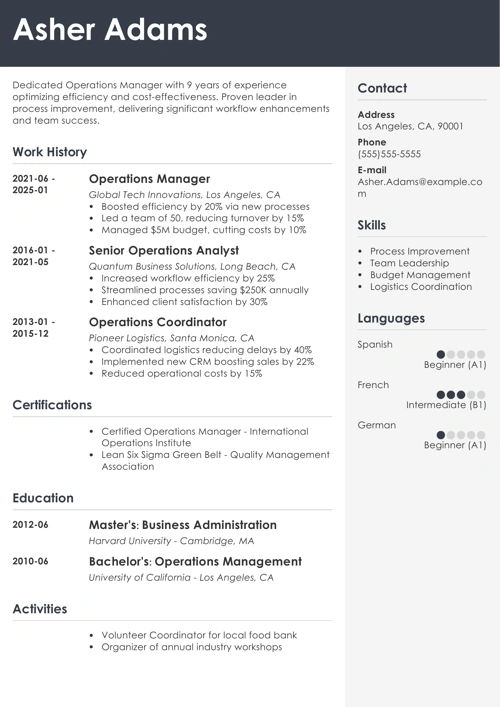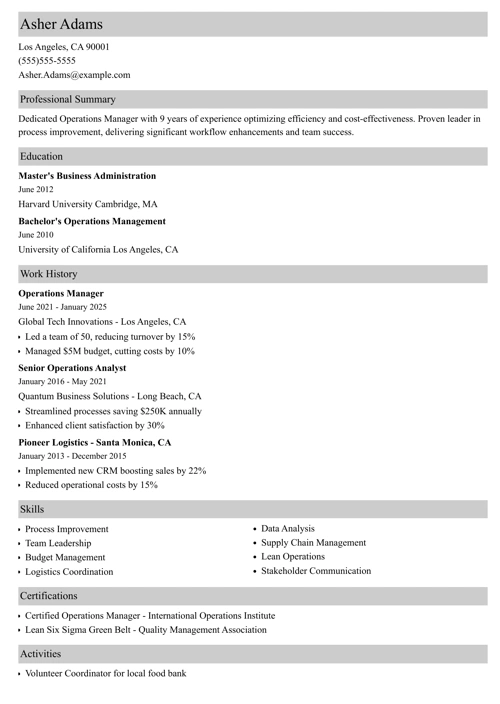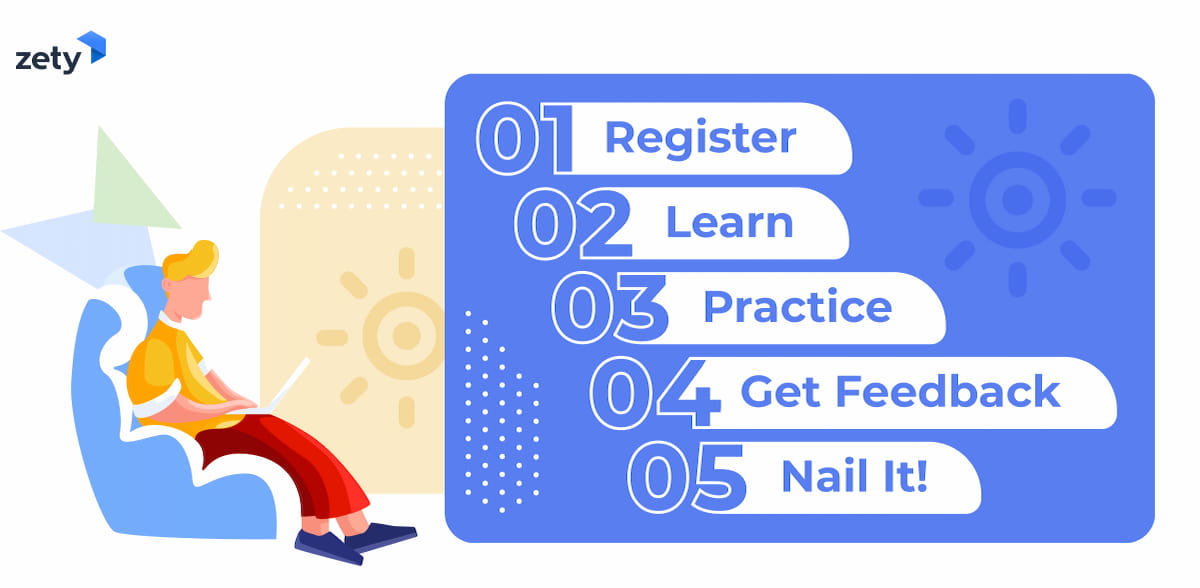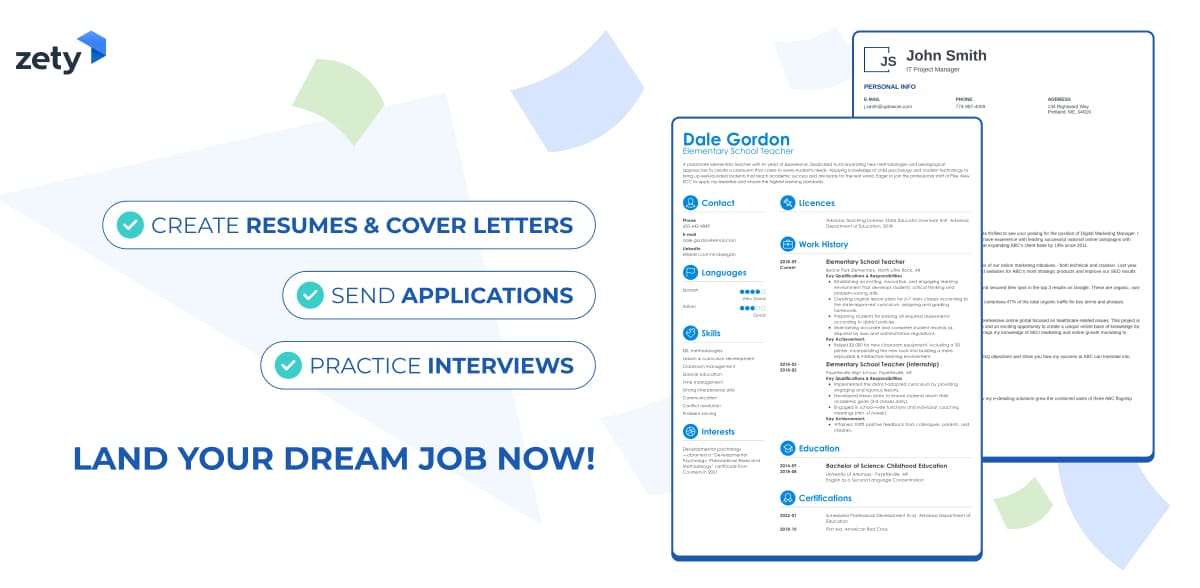Should you send a follow-up email after an interview? Yes! It's a great way to distinguish yourself from other candidates, as most never send follow-up interview emails. Increase your chances of landing that dream job and find out everything you should know about how to follow up after an interview.
This guide will show you:
- How to write a follow-up email after an interview better than 9 out of 10 others.
- What to write in your post-interview follow-up email depending on the scenario (first interview, second interview, phone interview, or after no response).
- Follow-up email after interview examples you can copy, adjust, and use today to make hiring you a no-brainer.
Do you want to hear you’re hired? Then start practicing with expert interview coaches now. Get access to a mock interview tool, use an impressive questions library to record your answers, and receive instant feedback. Don't let another opportunity pass you by.
Turn your next interview into a dream job offer.
After reviewing 11 million resumes created with our builder, we’ve collected valuable insights from a wide array of users spanning different industries and levels of experience. Here are the top takeaways to help you design a more effective resume:
Data-Backed Insights From Actual Resumes
- 57.84% of resumes made with our builder are over 300 words, 28.23% are between 101 and 300 words, and 5.35% are under 100 words.
- 3.59% of our users have no work experience, while 28.86% report having less than 3 years of experience.
- Resumes typically list an average of 12.56 skills.
- On average, resumes include 2.61 previous jobs.
Still waiting for an interview invite? Check our tips to prepare yourself:
- Following Up on a Job Application
- Most Popular Job Interview Questions
- Job Interview Tips
- Questions to Ask During a Job Interview
- Situational Interview Questions
Let’s get started then. Here’s how to write a follow-up email after an interview in 4 different scenarios:
Why Should You Send a Follow-Up Email After the Interview?
First of all, it’s a matter of good manners. More importantly, though, it’s what hiring managers want: 91% of employers like to receive follow-up thank-you notes. And yet, according to another study—57% of candidates don’t send them. Easy math, isn’t it? Following up on your interview with a thank you email gets you ahead of more than half of the competition.
Read more: Popular Phone Interview Questions & Answers
Follow-Up Email After an Interview Example
Here’s a sample follow-up email after an interview you can adjust and use for your thank you message:
Subject line: Pleasure to learn more about [Company Name]
Dear [Hiring Manager’s Name],
Thank you so much for taking the time to talk to me about the position of [the position you’re applying for] with [Company Name] this morning. It was a pleasure to learn more about your [innovative strategy / upcoming challenges/core values/industry insights].
The details you provided about the position convinced me that this is a job I would enjoy and one where I could make a valuable contribution with my skills and experience [refer to your specific area of expertise and how it can benefit your employer].
I was also thinking about what you said regarding [specific issue discussed during the interview]. In my last role as [your current or most recent position], I found that [data-backed explanation of how you would tackle the issue in question].
Finally, attached you will find the details of some of my projects we talked about. Please feel free to contact me if you find you need any more information. I look forward to our call next week, as discussed.
Thank you once again, [Hiring Manager’s Name].
Best regards,
Whatever stage of your job search you’re on right now, make sure you know how to use one of the most powerful tools you’ve got at hand: LinkedIn.How to Optimize Your LinkedIn Profile to Get Job Offers
How to Write a Follow-Up Email After an Interview?
- Open with a formal salutation and address the hiring manager by name.
- Express your appreciation and reinforce your interest in the position.
- Refer to specific company plans that you discussed during the interview.
- Suggest how your experience and skills can help the company.
- Say that you’re willing to provide them with any additional information and confirm when a final decision is to be made.
When to Follow Up After an Interview?
The sooner, the better—the same day as the interview or the next, but definitely no later than 24 hours after the interview.
What’s the Best Interview Follow-Up Email Subject Line?
One that’s short and makes it clear what the message is about. Take a look at these examples.
Sample Subject Lines for a Follow-Up Email After an Interview
- Thank you, [Interviewer’s Name]!
- Thanks for your time today!
- Thank you for the opportunity!
- Appreciate your time and advice.
- I enjoyed learning more about [Company Name]. Thank you!
Pro Tip: If you interviewed several people, send separate, personalized notes to each of them.
Phone Interview Follow-Up Email: Is It Any Different?
If you had a regular phone interview after submitting an application, the rules for a standard interview follow-up email apply.
But, if you’ve been screened during a sourcing process—when the employer found you, and not the other way around and you’re interested—clearly reiterate that. Sources often interview multiple people on the same day. Their job is to engage candidates and weed out those not genuinely keen on the offer. Show them your engagement.
How to Write a Follow-Up Email After a Phone Interview?
- Thank them for their time and interest.
- Emphasize your interest. Be specific: say what parts of the job excite you and why.
- Enclose your well-written resume and a cover letter to outline and support your key selling points.
- Keep it short.
Take a look at this interview follow-up email sample:
Follow-Up Email After Phone Interview Template
Subject line: Thank you for the opportunity, [Hiring Manager’s Name]!
Dear [Hiring Manager’s Name],
Thank you for talking with me today. I really appreciated learning more about [Company Name]. It was great to learn that you share my approach to [industry/business]. I particularly liked the way you [specific detail about the company you learned during the interview].
I’m looking forward to meeting with you in person and discussing our cooperation further. Please find attached my resume and cover letter with detailed work experience.
Best,
[Your sign-off]
Pro Tip: Not interested in the job after the interview? Send a thank you follow-up email anyway. Thank them for their time and consideration, explain why the position isn’t a good match for your skills and experience, and let them know you’d like to stay in touch if they have suitable openings. Never burn bridges on the job market.
How to Follow Up After a Second Interview?
The biggest difference between the first and second interview follow-up emails is that the deeper you run into the recruitment process, the more detailed you should be in your messages.
You’ve probably discussed particular plans and challenges or the details of the position. After a second interview, in your follow-up letter, provide information on how you would tackle them.
Here’s another post-interview follow-up email template:
Second Interview: Follow-Up Email Example
Subject line: It was a pleasure to talk about [the name of the position] with [Company Name]
Dear [Interviewer’s Name],
Thank you for the opportunity to come and chat for the second time. Now, I am even more certain that working with [the team name] would be a dream come true for me.
I started to think about the [project] we discussed—I have some ideas on how to make it successful. I describe them briefly in the attached presentation. Please let me know what you think. I’d be happy to explain the details and hope to get the chance to discuss them with you later.
Thank you again for your time and advice. Looking forward to hearing from you.
Best,
[Your sign-off]
Join other members in mastering the know-how behind the pre-interview stage. Use the practice set tailored to your experience level and find out what to improve. You’ll feel instantly ready to nail your next interview.
Connect with interview coaches today. You’ll know you did a good job when you’re done.
How to Send a Follow-Up Email After No Response?
So you’ve learned how to write a follow-up email after an interview, crafted your perfect follow-up letter, and sent it right after the talk. And then—weeks go by. And there’s no call-back.
Don’t lose hope. You might still be very much in the running. And, with another follow-up email, you might become the top seed.
A follow-up letter after an interview with no response might be difficult to write.
But all you need to do is ask about the interview result politely and professionally enough so you don’t come across as a pest.
When to Send a Second Follow-Up Email After Interview After No Response?
Only after the established deadline has passed. Unless you got another offer. In such case, if you’re planning to accept it, let all other companies know.
If, on the other hand, you would rather work with this, not that company, tell them about the competitive offer—if they’re interested in you, they’ll likely be eager to speed up the decision-making process.
And what to write in your second follow-up email?
Most importantly: not much.
- Remind them of the passed deadline.
- State that you’re still interested.
- Ask if they’d like you to provide any additional information.
Have a look at this sample.
Second Follow-Up Email after Interview (No Response)
Subject line: Following up on an interview for [the name of the position]
Dear [Hiring Manager’s Name],
I thought I’d check in as, during our last interview, you mentioned that you’d be making the final recruitment decision for the [the name of your position] by [the established deadline].
Please, let me know if you have an update and if there are any additional details I could provide you to facilitate the hiring process.
Best,
[Your sign-off]
Here’s another example of a follow-up email after a job interview in case you were offered another position:
Second Follow-Up Email After the Interview—Competitive Job Offer
Subject line: Following up on an interview for [the name of the position]
Dear [Hiring Manager’s Name],
I would like to let you know that I have been offered a position with [Company Name]. My deadline for accepting or rejecting it passes on [the established deadline].
However, I’d be happy to turn down that offer if you chose me as your new [the name of the position]. Please, let me know if you’re likely to reach a hiring decision before the deadline I established with [Company Name].
If you need any additional information from me, please let me know.
Best,
[Your sign-off]
Simple as that.
Read more: How to Decline a Job Offer Politely [+ Examples]
How to Follow Up After an Interview—Email or Phone Call?
Let’s look at some data. 46% of recruiters and hiring managers prefer to be contacted by email. Only two out of five were open to phone calls. If you’re not positive that your hiring manager would be okay with your calling them—stick to the battle-tested follow-up email.
Pro Tip: And what if you don’t get that job? Get over it, accept your lost opportunity, and move on, right? Wrong. Even if things didn’t work out, use this as a networking opportunity. Connect with the hiring manager on LinkedIn and keep the conversation going: maybe send some articles that might be relevant to them, and congratulate them on their accomplishments. You never know what connections might prove useful in the future.
Getting ready for an interview? That’s great! How about finding even more opportunities? The best way to apply is with a resume created in our auto-fill resume builder. Attach a professional cover letter from our cover letter builder to create an irresistible duo.
Make a resume template and a cover letter template work together, and get ready for your incoming interviews!
Key Takeaway
Here's how to write a perfect follow-up email after an interview:
- Write the first interview follow-up email within 24 hours after the interview.
- Send a separate, personalized email to everyone you interviewed with.
- Be specific (especially when following up on a second interview). Suggest how you can help the company.
- Write a second follow-up email to ask for an update If you get no response after the established deadline.
- Follow up even sooner if you’ve received another offer, whether you’re planning to accept it.
- Stay in touch with the company—even if you don’t get the job. Nowadays, networking is more important than ever!
So there you have it. All you need to know about following up on a job interview.
About Zety’s Editorial Process
This article has been reviewed by our editorial team to make sure it follows Zety's editorial guidelines. We’re committed to sharing our expertise and giving you trustworthy career advice tailored to your needs. High-quality content is what brings over 40 million readers to our site every year. But we don't stop there. Our team conducts original research to understand the job market better, and we pride ourselves on being quoted by top universities and prime media outlets from around the world.





